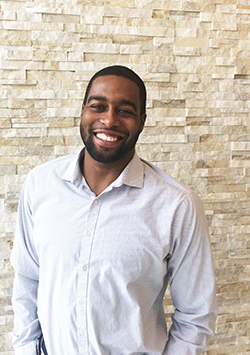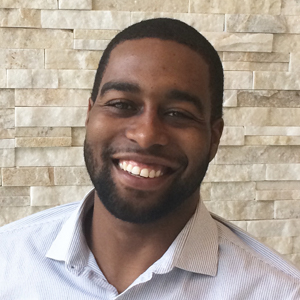‘There is a lot of work to do’
I am often told that I do not fit the stereotypical profile of a scientist. Is it because I am a tall, former collegiate swimmer and extremely extroverted? Or is it because I grew up in Baltimore City and posed for pictures at my Ph.D. graduation ceremony with dreadlocks under my cap? As you may have guessed, I am a young African-American male scientist. I am not the first, but I am still a rarity in the life sciences. My atypical look provides an opportunity to engage with others to deconstruct the stereotype and actively diversify the profile of scientists.
 Christopher W. Williams
Christopher W. Williams
Although I am passionate about science, I realize that I could be the last scientist in my family. I accept that my future children may not be interested in following in my footsteps. However, I do not accept that a child, especially one who looks like me, may never have the opportunity to become a scientist and contribute to groundbreaking research, discovery and innovation.
My strategy to address this concern is to start the recruiting process early for the next generation of African-American scientists through effective science education and outreach initiatives. My recruiting tactic is simple: I show up. I consistently give my time and energy to disprove misconceptions about who scientists are, what they look like and how they can impact the world. The students do the rest of the work. They are challenged and encouraged with science lessons and, as a result, demonstrate improved reading, analytical, math and interpersonal communication skills.
My goal is not to turn anyone into a scientist but rather to improve scientific literacy and allow future scientists to reveal themselves. Ultimately, I want the students that I interact with to become more focused and confident individuals.
With that said, I must get going. There is a lot of work to do.
Enjoy reading ASBMB Today?
Become a member to receive the print edition four times a year and the digital edition monthly.
Learn moreGet the latest from ASBMB Today
Enter your email address, and we’ll send you a weekly email with recent articles, interviews and more.
Latest in Opinions
Opinions highlights or most popular articles

Women’s health cannot leave rare diseases behind
A physician living with lymphangioleiomyomatosis and a basic scientist explain why patient-driven, trial-ready research is essential to turning momentum into meaningful progress.

Making my spicy brain work for me
Researcher Reid Blanchett reflects on her journey navigating mental health struggles through graduate school. She found a new path in bioinformatics, proving that science can be flexible, forgiving and full of second chances.

The tortoise wins: How slowing down saved my Ph.D.
Graduate student Amy Bounds reflects on how slowing down in the lab not only improved her relationship with work but also made her a more productive scientist.

How pediatric cataracts shaped my scientific journey
Undergraduate student Grace Jones shares how she transformed her childhood cataract diagnosis into a scientific purpose. She explores how biochemistry can bring a clearer vision to others, and how personal history can shape discovery.

Debugging my code and teaching with ChatGPT
AI tools like ChatGPT have changed the way an assistant professor teaches and does research. But, he asserts that real growth still comes from struggle, and educators must help students use AI wisely — as scaffolds, not shortcuts.

AI in the lab: The power of smarter questions
An assistant professor discusses AI's evolution from a buzzword to a trusted research partner. It helps streamline reviews, troubleshoot code, save time and spark ideas, but its success relies on combining AI with expertise and critical thinking.

